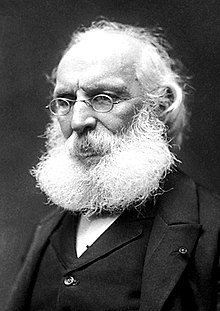Frédéric Passy
Frédéric Passy (born May 20, 1822 in Paris , † June 12, 1912 in Neuilly-sur-Seine ) was a French parliamentarian and humanist . As "Apostle of Peace" he was awarded the first Nobel Peace Prize in 1901 together with Henry Dunant . Together with William Randal Cremer , Passy founded the Inter-Parliamentary Union in 1889 .
job
After studying law , Frédéric Passy entered civil service at the age of 22 . He left this job after three years and devoted himself to studying economics and journalism . After graduating, he got a position as a teacher at the University of Montpellier where he wrote the two-volume work Leçons d'économie politique from 1860 to 1861 .
In 1877 Passy was awarded membership of the Académie des sciences morales et politiques .
Politician
On May 21, 1867 he founded the Ligue internationale et permanent de la paix , which was later renamed the Société d'arbitrage entre les Nations . With this peace league he wanted to put pressure on the French government so that it could solve the Luxembourg crisis in the conflict with Prussia without bloodshed. It was unsuccessful and in 1870 the Franco-Prussian War broke out .
This commitment to peace made him popular, he was elected as a member of the French National Assembly in 1881 , where he remained until 1889. As a member of parliament, he campaigned for the improvement of working conditions for industrial workers. He fought against colonialism and demanded the establishment of an international court of arbitration for conflict resolution.
Apostle of Peace

In 1888, 9 British and 24 French parliamentarians met in Paris under the leadership of Passy and Sir William Randal Cremer to found an "Inter-Parliamentary Arbitration Association". The aims of this association were the promotion of peace and the peaceful settlement of conflicts. Together with William Randal Cremer, Passy founded the Inter-Parliamentary Union in 1889 .
Frédéric Passy's achievement and commitment as the founder and president of the Société française pour l'arbitrage entre nations was awarded the first Nobel Peace Prize on December 10, 1901 .
Frédéric Passy campaigned for peace for half his life and became world-famous as the “Apostle of Peace”. Passy wrote lively and tirelessly into old age, in 1909 at the age of 87 he wrote his life's work Pour la paix .
Works (selection)
- De la propriété intéllectuelle. Études . Guillaumin, Paris 1859 (together with Victor Modeste and P. Paillote)
- La démocratie et l'instruction . Guillaumin, Paris 1864.
- L'histoire du travail. Leçons faites aux soirées littéraires de la Sorbonne . Bellaire, Paris 1873.
- Leçons d'économie politique. Faites à Montpellier . Gras, Montpellier 1861 (edited by Émile Bertin and Paul Glaize)
- Les machines et leur influence sur le développement de l'humanité . Hachette, Paris 1866.
- Mélange économique . Guillaumin, Paris 1857.
- The principle of the population. Malthus et sa doctrine . Paris 1868.
- Pour la paix . Charpentier, Paris 1909.
- Sophismes et truismes . Giard & Brière, Paris 1910.
literature
- American Journal of International Law : Frédéric Passy (September 1912)
- Lucien Le Foyer: Un Grand Pacifiste (June 29, 1912)
- Herbert Maza: Frédéric Passy: La Fondation de l'Union Interparlamentaire (1965)
Web links
- Literature by and about Frédéric Passy in the catalog of the German National Library
- Information from the Nobel Foundation on the 1901 award ceremony for Frédéric Passy
| personal data | |
|---|---|
| SURNAME | Passy, Frédéric |
| BRIEF DESCRIPTION | French parliamentarian and humanist |
| DATE OF BIRTH | May 20, 1822 |
| PLACE OF BIRTH | Paris |
| DATE OF DEATH | June 12, 1912 |
| Place of death | Neuilly-sur-Seine |
